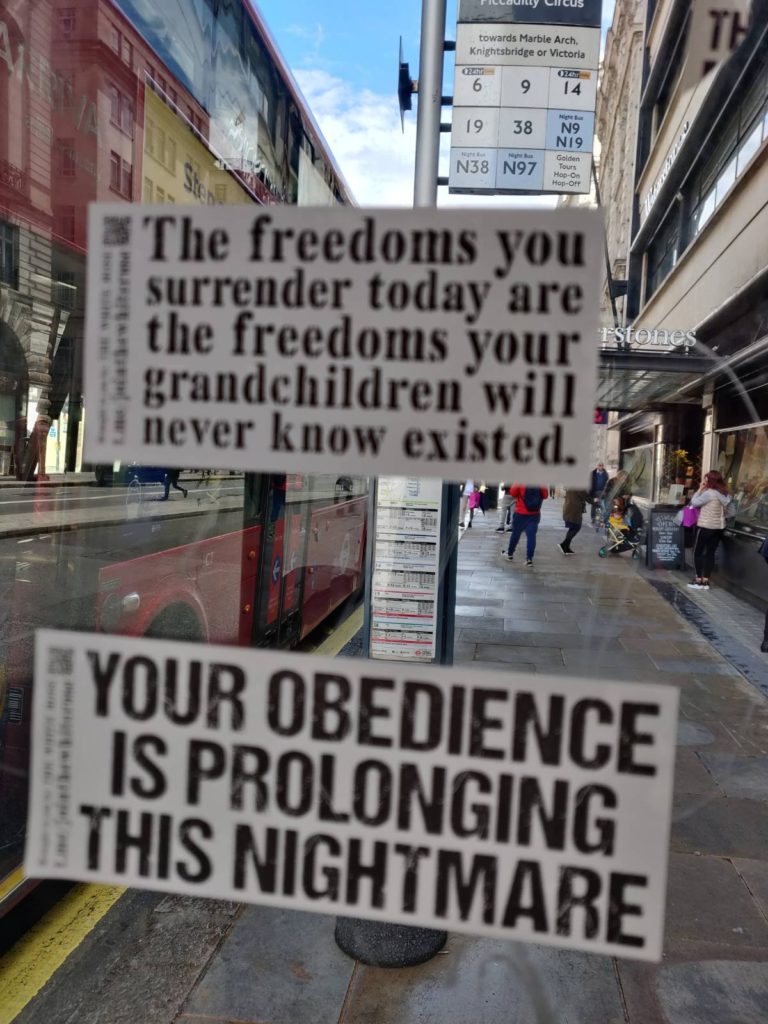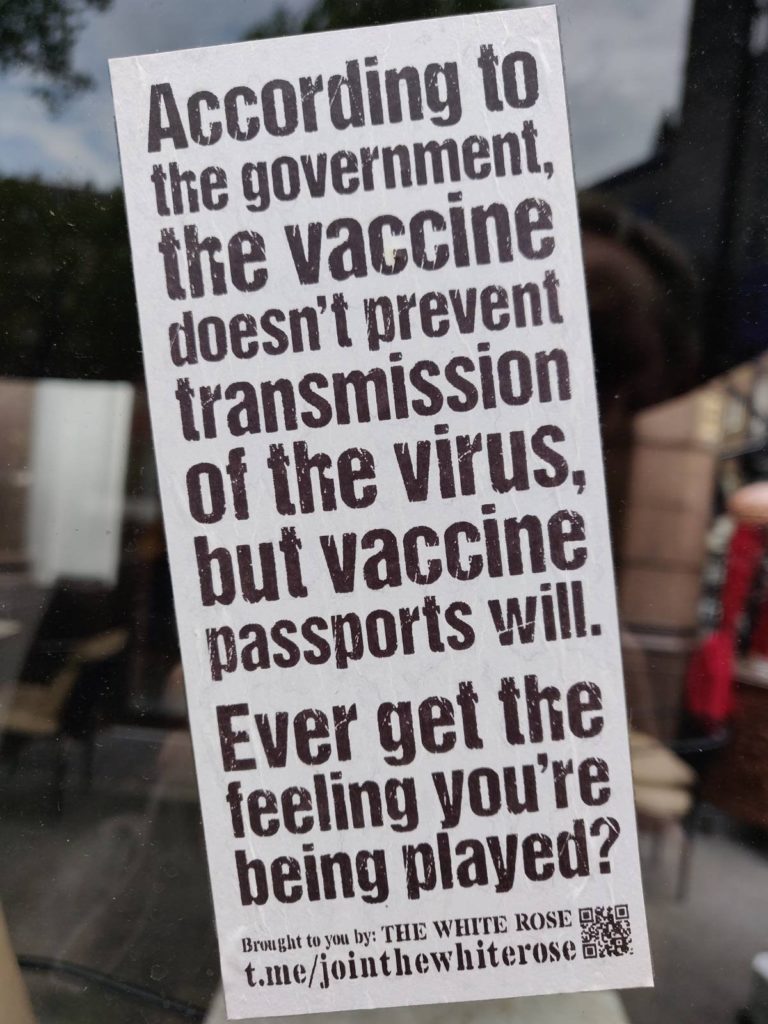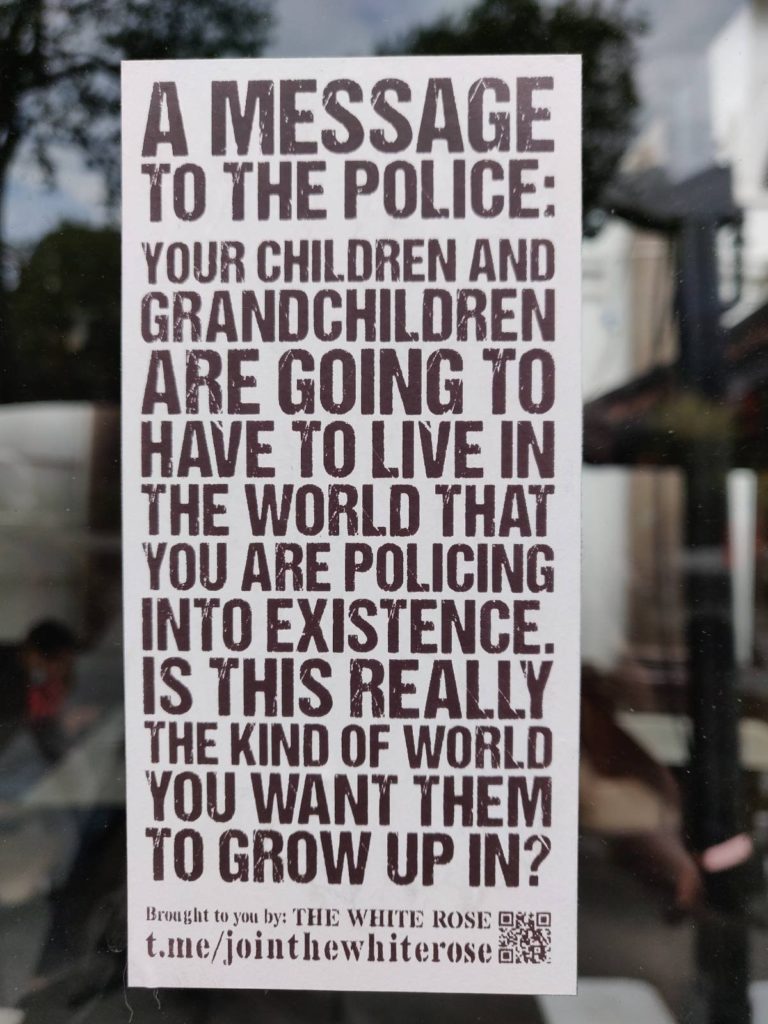We are developing the social individualist meta-context for the future. From the very serious to the extremely frivolous... lets see what is on the mind of the Samizdata people.
Samizdata, derived from Samizdat /n. - a system of clandestine publication of banned literature in the USSR [Russ.,= self-publishing house]
|
“Chicago mayor’s decision to only speak to journalists of color is commendable, not racist”, writes someone in the Independent. The apparent erasure of the author’s identity was the Independent‘s doing, not mine, but they – the author – describe themselves as a Black and Native American writer who finds Mayor Lori Lightfoot’s demand to only speak with journalists of colour commendable.
On libertarian principle, I support the right of Ms Lightfoot or anyone else to refuse to associate with people of a different race, but unlike this author I disapprove of racism.
Unless someone invents a way to store energy in massive bulk, Net Zero will mean quivering under duvets in the dark on windless winter nights. We are on the path to poverty, misery and a failure to inspire the world to decarbonise.
With costs not yet apparent in people’s lives, MPs have been content to rub along with consensus, dealing with more immediate existential crises, like the political fiascos over Brexit and the pandemic. Only now, with Brexit behind us and as the economy and life open up after the pandemic, a few commentators are starting to question whether families, businesses and the UK economy as a whole can really afford the astronomical costs of renewables. Ministers urgently need to respond candidly in full to those questions.
If ministers don’t obtain and maintain the consent of the public for Net Zero now with full and frank explanations of the costs and changes ahead — as they relentlessly have not during the panic of the pandemic — eventually there will be a terrible revolt. Fear will not be enough. Even the “nudging” government scientists currently engaging in it confess that, “using fear as a means of control is not ethical” and it “smacks of totalitarianism”. Is this really who we want to be?
– Steve Baker discussing the Net Zero insanity.
Unfortunately, if the last year and a half have shown anything, yes, that is indeed “who we want to be”, or at least a great many people do. But until the Tories not just abandon Net Zero but actively repudiate it, there is no way in hell I will even consider voting for them at any level of government.
While Dr Fauci’s wisdom is questioned openly, Britain is haunted by the presence of Prof Neil Ferguson, who repeatedly returns to our screens like a bad horror movie. Rarely has any expert in British life been more wrong about so many major things, and yet still he crops up, where he is given a respectful audience at government level and by most of the media. His latest appearance has seen him warning — with the Prime Minister following suit — that the Indian variant of Covid might necessitate delaying the end of lockdown. But what is striking is not just that Ferguson gets away with repeatedly being wrong, but that his constant urges for greater caution are not balanced by any force urging the opposite.
– Douglas Murray
“CMV” stands for “Change my view”. It is the name of a subreddit where people go to argue, expecting disagreement, as I expect it now.
In the most recent Queen’s Speech, Her Majesty told the Lords and the Commons that “My Government will invest in new green industries to create jobs”, but there were serious proposals as well. She also said, “Legislation will be introduced to ensure the integrity of elections”. This was a reference to the proposed Electoral Integrity Bill. You can read the Hansard account of the debate in Parliament here. Chloe Smith MP, who it appears is the Minister for the Constitution and Devolution, there’s posh now, said,
Asking voters to prove their identities will safeguard against the potential in our current system for someone to cast another person’s vote at the polling station. Showing identification is something people of all backgrounds do every day.
Northern Ireland has used voter identification in its elections since 1985, and expanded this in 2003 during the last Labour Government. In the first general election after photographic identification was introduced in Northern Ireland by the then Labour Government (2005), turnout in Northern Ireland was higher than in each of England, Scotland and Wales. Since then, the experience in Northern Ireland has shown that once voter identification is established as part of the voting system the vast majority of electors complete the voting process after arriving at the polling station. A wide range of countries, such as Canada and most European nations, require some form of identification to vote.
New research published yesterday on www.gov.uk clearly indicates that the vast majority of the electorate of Great Britain, 98% of electors, already own an eligible form of identification, which includes a broad range of documents and expired photographic identification.
And, um, that sounds fair to me. Note that the Northern Irish Electoral Identity Card is not required to be shown before one can vote. It is but one of several acceptable forms of ID, and is issued free of charge to those people who don’t have any of the other forms so that nobody will be unable to vote due to poverty. It is not the abominable high-tech integrated without-this-you-starve Identity Nexus proposed by the Right Honourable Tony Blair. My opinions on that have not changed since 2003. To look at, the Northern Irish Electoral Identity card is a poxy little photocard that looks like it was issued by your local library. This lack of sophistication, the fact that you only need the effing thing once every five years or so, and the fact that voters have been obliged to show ID before voting in Northern Ireland for years without any obvious bad consequences, lead me not to fear the rollout of a similar scheme in the rest of the UK as the first step on the slippery slope towards a national ID card.
As to whether a legal requirement to show photographic ID before one votes is a thing good, bad or indifferent in itself, that is a separate debate. Dawn Butler MP, writing in the Times, says, “This, to me, is nothing more than a cynical attempt at voter suppression by our government — and it must be stopped. It mirrors some of the subversive tactics deployed in some states in America.” Jess Garland of the Electoral Reform Society writes in the Guardian that it would undermine democracy. Over in the US, where the state of Georgia has recently passed its own Election Integrity Act, President Biden said a thing about eagles.
“There’s also the problem of, as our liberal friends would put it, power dynamics. At least when Stewart was battling the Bush administration, you could make the argument that liberalism was a minority persuasion in America. Today, the left is a political and cultural juggernaut, dominating the elected federal government, the civil service, the mainstream press, Hollywood, Big Tech, increasingly even the corporate world. It’s our new civic religion, which has turned its comedians into something like high priests, mouthing its tenets and ridiculing its apostates. All the old rules of satire — don’t punch down, afflict the comfortable — amount to a generally anti-authoritarian and iconoclastic mindset. Yet Stewart’s imitators exist only to reinforce the existing authorities while at the same time pretending they don’t have any authority at all.”
– Matt Purple. He is writing in the US edition of the UK-based Spectator, so usual health warnings apply to the American misuse of the word “liberal”.

Epic 🤣
Conservatives? What conservatives? The Conservative Party of 2021 is Blairite ideologically, not conservative. If I wanted ruinous NetZero policies and even more state control over civil society needed to impose them, I’d vote for the Green Party. But if I’m going to get those policies even if I vote Tory, then why on earth would I vote Tory?
The educational & media establishment are now utterly dominated by the far left, with the Tories asleep at the wheel the whole time. Woke culture backed by regulation is now rapidly spreading into Big Business, with the Tories equally lackadaisical. And is there a single aspect of civil society not now regulated by the state? If the Conservatives have no interest in conserving civil society, rather than nationalising it, then you people are utterly pointless. If you were a company, you’d be prosecuted under the Trade Descriptions Act for calling yourselves conservatives.
After having only ever voted Tory all my life, the spell was broken in the final Euro elections when I voted BXP. I will not be voting for you people again.
– Perry de Havilland, replying to “Now is a great time to be a Conservative.”
“It has become something of a cliche, but it also happens to be true. If you want to do your bit for the planet, forget Tesla and other super-expensive electric vehicles: just carry on driving the same old gas-guzzling banger you’ve always had. As much, if not more, carbon tends to be expended producing a new car as actually driving one.”
– Jeremy Warner, Daily Telegraph (£).
I own an S-Type Jaguar (V6, 3-litre) – one of the last ones to be built – and it drives as smooth as you like, and what makes it all the sweeter is knowing that every time I turn that big black cat’s engine on, a little bit of Greta Thunberg’s cult hopefully dies.
The logistics chain that is Amazon, or Walmart, or even a Ralph’s, is one of the grand capitalist achievements in history. It used to be, in those heady days before the capitalists inserted themselves into the food supply system, that the working man spent 80% of income on food and rent. Sure, rent is a bit of a problem in certain places still. But food bills have fallen to perhaps 10% of household income.
We can check this too. Back in 1962 or so Mollie Orshansky noted that a poor family was spending about 30% or so of income on food. So, if we take a reasonable diet and triple it – roughly – then we’ve got a reasonable estimation of the poverty line. Sure, it was a back of the fag packet estimation and was meant to be used for a year or two while they all figured out something more sensible. But that is what the Official Poverty Line in the US is today, merely upgraded for inflation. And as general inflation has been significantly higher than food price inflation over those decades that average poor family, on the same inflation adjusted budget, is now spending 12 to 15%, not 30%, of their budget on food.
Supermarkets are the reason why. The people who own supermarkets charge a 1 or 2% margin on their activities. They get 2%, we get a 50% reduction in costs. It’s one of the great bargains of all time.
And this is what Guardian columnists complain about…
– Tim Worstall
George Archer-Shee died at nineteen, in what might almost be called a natural death for a young British man of his class at that time – he was killed in the First Battle of Ypres. His name is inscribed on the Menin Gate but he has no known grave.
He shared the manner of his death with thousands of others, but, quite against his own wishes, his short life before that had taken an unusual turn. At the time of his death he had been famous for six years.
It all started in 1908 when George Archer-Shee was thirteen and a cadet at the Royal Naval College, Osborne. He was accused of having stolen a five shilling postal order intended for another cadet. An elderly post office clerk said she remembered Archer-Shee as having cashed two postal orders that day, one of his own (which no one denied) and the stolen one. Archer-Shee protested his innocence to no avail; he was expelled without much ceremony.
That should have been that, a minor story of Edwardian disgrace, but his father refused to take it lying down. He engaged one of the most celebrated lawyers of the day – Sir Edward Carson, famous for many reasons, some of which are still controversial today, and determined to pursue the case to the highest court in the land. But there was a slight problem: if I have understood it right, at that time one could not sue the Crown.
Quoting a 1939 article in the Pennsylvania Law Review:
It was early recognized in England that while an action could not be brought against the King, yet as the “fountain of justice and equity” he would entertain petitions from his subjects for the redress of their wrongs; and it was established during the reign of Edward I that the subject might bring a petition of right, which, if approved by the King, would be heard in his courts. The King indicated his approval of the petition by writing on it, “Let right be done”. A petition of right, as distinguished from a petition of grace, asked “for something which the suppliant could claim as a right, if the claim were made against any one but the King”. Originally a petition of right was employed only to recover some interest in land, and there was doubt whether it would lie to recover chattels, but by the time of Henry VI it was settled that it would lie for the recovery of goods and chattels. It was not until 1874 that it was decided that the petition would lie for breach of contract. It would never lie for a tort, for the King can do no wrong.
At the time the petition of right was filed in the Archer-Shee case the law was clear that those in the service of the Crown, whether military or civil, could be dismissed at will and were without remedy by petition of right or otherwise.
Carson won in the end, as he usually did. Archer-Shee was exonerated. And the important precedent was set that the King can do wrong, and can be sued.
So far, so Whig history. The setting of that precedent is how I come to know about the case. I think I read a rather good account of it and why it mattered in Look and Learn magazine in the mid 1970s. Terence Rattigan wrote a play loosely based on the story called The Winslow Boy. It has been filmed at least twice.
But a more recent event also involving the Post Office – and the refusal of the Post Office to admit the possibility of error – and the refusal of the British State as a whole to admit the possibility of the Post Office being in error – and the blackening of the names of innocent people – made me think that we need to learn that lesson again.
Let the BBC tell the story:
Post Office scandal: What the Horizon saga is all about
A group of former sub-postmasters and sub-postmistresses have seen their names cleared at the Court of Appeal after the UK’s most widespread miscarriage of justice.
It marks the latest stage of a computer scandal, and a long and complex legal battle, which could leave the Post Office with a huge compensation bill.
Between 2000 and 2014, the Post Office prosecuted 736 sub-postmasters and sub-postmistresses – an average of one a week – based on information from a recently installed computer system called Horizon.
Some went to prison following convictions for false accounting and theft, many were financially ruined and have described being shunned by their communities. Some have since died.
Edit: In the comments Rudolph Hucker pointed out that the doctrine driving the Post Office’s reckless prosecution of so many of its own employees bore an even closer parallel to the doctrine, supposedly overturned by the Archer-Shee case, that “the King can do no wrong” than I thought. He linked to a piece from the radio station LBC called ‘The Post Office were mendacious in the way they denied justice’ The title is a quote from Nick Wallis, a journalist who has been covering the Horizon scandal for many years.
Due to its long legacy, the Post Office has a “proximity to state power that is almost unparalleled.”
Mr Wallis continued: “It was able to use its own investigation and prosecution units to bypass the CPS and the police force to prosecute its own employees to the tune of one a week for 14 years. There were 736 successful convictions just using Horizon IT evidence.”
He told Shelagh that when the Post Office found out its prosecutions may be unsafe, “they covered it up.”
“They went out of their way to say to campaigning MPs and the Justice for the Postmasters’ Alliance that nothing was going wrong with the IT system and there was nothing wrong with their prosecution.”
They then “threw tens of millions of pounds trying to deny the subpostmasters justice,” Mr Wallis said.
“They were mendacious in the way they went about denying justice and they colluded with the Government in order to do this, because the Government is 100% shareholder of the Post Office and it has skin in this game.”
Yes, ditch Google. By all means. Just be aware that:
* Stopping your use of the Google search engine is just the start. A small, very modest start. You will have a lot more work to do to “deGoogle” from the Borg—and that’s not mentioning the rest: Facebook, Twitter, etc—though that is a vast subject, way beyond the scope of this post.
* Switching to DuckDuckGo is, if not worse, at the very least not better in the context of this culture war.
And when I say “if not worse”, it’s more rhetorical mannerism than anything else.
In your quest to reject Google and the rest of the hostiles, you will have to do your homework. If you’re looking at DuckDuckGo, start with the FEC site. You will see, for instance, that for 2019-2020, all the donations from DuckDuckGo employees have gone Left.
Let that sink in. While not all of DuckDuckGo’s 124 employees have donated, not one has donated outside of the Party line.
– The Dissident Frogman
|
Who Are We? The Samizdata people are a bunch of sinister and heavily armed globalist illuminati who seek to infect the entire world with the values of personal liberty and several property. Amongst our many crimes is a sense of humour and the intermittent use of British spelling.
We are also a varied group made up of social individualists, classical liberals, whigs, libertarians, extropians, futurists, ‘Porcupines’, Karl Popper fetishists, recovering neo-conservatives, crazed Ayn Rand worshipers, over-caffeinated Virginia Postrel devotees, witty Frédéric Bastiat wannabes, cypherpunks, minarchists, kritarchists and wild-eyed anarcho-capitalists from Britain, North America, Australia and Europe.
|









